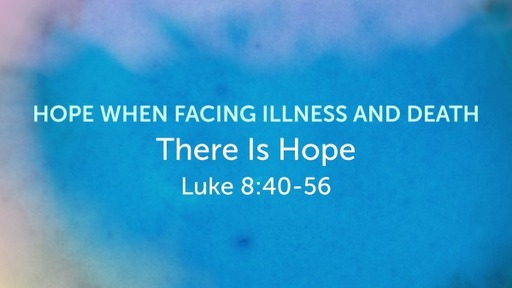Hope When Facing Illness and Death

Fear of Death or Serious Illness
40 When Jesus returned, the crowd welcomed him, for they were all expecting him. 41 Just then, a man named Jairus came. He was a leader of the synagogue. He fell down at Jesus’s feet and pleaded with him to come to his house, 42 because he had an only daughter about twelve years old, and she was dying.
While he was going, the crowds were nearly crushing him. 43 A woman suffering from bleeding for twelve years, who had spent all she had on doctors and yet could not be healed by any, 44 approached from behind and touched the end of his robe. Instantly her bleeding stopped.
45 “Who touched me?” Jesus asked.
When they all denied it, Peter said, “Master, the crowds are hemming you in and pressing against you.”
46 “Someone did touch me,” said Jesus. “I know that power has gone out from me.” 47 When the woman saw that she was discovered, she came trembling and fell down before him. In the presence of all the people, she declared the reason she had touched him and how she was instantly healed. 48 “Daughter,” he said to her, “your faith has saved you. Go in peace.”
49 While he was still speaking, someone came from the synagogue leader’s house and said, “Your daughter is dead. Don’t bother the teacher anymore.”
50 When Jesus heard it, he answered him, “Don’t be afraid. Only believe, and she will be saved.” 51 After he came to the house, he let no one enter with him except Peter, John, James, and the child’s father and mother. 52 Everyone was crying and mourning for her. But he said, “Stop crying, because she is not dead but asleep.”
53 They laughed at him, because they knew she was dead. 54 So he took her by the hand and called out, “Child, get up!” 55 Her spirit returned, and she got up at once. Then he gave orders that she be given something to eat. 56 Her parents were astounded, but he instructed them to tell no one what had happened.
Looking to Jesus For Help
The Miracle Is Happens for The Woman
While he was still speaking, someone came from the synagogue leader’s house and said, “Your daughter is dead. Don’t bother the teacher anymore.”
50 When Jesus heard it, he answered him, “Don’t be afraid. Only believe, and she will be saved.”
